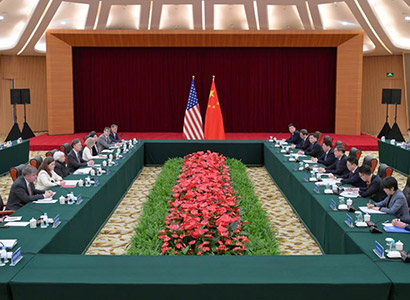China, US discuss key economic issues as Yellen visit continues
(Global Times) -- Visiting US Secretary of the Treasury Janet Yellen has reportedly arrived in Beijing on Saturday to continue meetings with senior Chinese officials, after having “candid, pragmatic and constructive” communication in the southern city of Guangzhou with Vice Premier He Lifeng, who is also China’s lead person for China-US economic and trade affairs.
 |
| He Lifeng, Chinese vice premier and Chinese lead person for China-US economic and trade affairs, holds talks with US Secretary of Treasury Janet Yellen, also US lead representative, in Guangzhou, south China’s Guangdong Province. |
Yellen is on a high-stakes six-day visit to China from April 4 to 9, her second since July 2023 during which she had five-hour talks with He. The two officials also met on the sidelines of the San Francisco China-US summit in November 2023.
Though visit by a high-profile US official signifies further stabilization of bilateral relations since the summit, Chinese analysts expressed concern that the US’ current gestures may not be sustained as flashpoints including the Taiwan question and South China Sea issue still exist, and the US continues to hold the wrong perception toward China.
According to Xinhua News Agency, Yellen and He held several rounds of talks on Friday and Saturday in the city of Guangzhou in south China.
Focusing on the implementation of the important consensus between the two countries’ heads of state, the two sides had candid, pragmatic and constructive discussions on the macroeconomic situation of the two countries and the world, the economic relationship between China and the US, and global challenges.
The two sides agreed to discuss issues such as balanced growth of the US, China and the global economy, financial stability, sustainable finance, and cooperation in countering money-laundering under the China-US economic and financial working group. The Chinese side expressed grave concern over US economic and trade measures restricting China and responded fully to the issue of production capacity. Both sides agreed to continue to maintain communication, Xinhua reported.
Yellen’s visit came days after Chinese President Xi Jinping and US President Joe Biden had a phone conversation on Tuesday, signaling willingness to manage tensions despite growing divergence.
Wang Peng, an associate research fellow from the Beijing Academy of Social Sciences, told the Global Times on Saturday that through talks between He and Yellen, China and the US can hopefully reach effective communication to promote future cooperation at the technical level, such as financial cooperation and enhanced regulatory exchanges.
Overall, the pros of maintaining close communication in the economic and trade areas between China and the US outweigh the cons, as it provides opportunities to strengthen mutual understanding and mutual trust, and facilitate the resolution of common challenges and send positive signals to the world, said the expert, adding that in the face of domestic debt and other issues, the US needs to maintain stable economic and trade relations with China to seek common interests, Wang noted.
However, Yellen raised the issue of so-called overcapacity of the Chinese green energy sector. According to Associated Press, claiming China’s role constitutes pressure on other countries, Yellen didn’t rule out taking additional steps to counter Chinese subsidies.
Observers also mentioned that the US’ crackdown on Chinese high-tech firms and chip sector, hacking accusations and smears against China’s development in Artificial Intelligence have not slowed down.
Chinese Ambassador to the US Xie Feng said during an interview with Newsweek that the accusation that China’s “overcapacity” is posing threats to other countries is untenable. Globally, high-quality industrial capacity and new-quality productive forces are not excessive, but in dire scarcity. China’s new energy sector relies on the businesses’ innovation edge forged amid global competition and high-quality products, not on so-called subsidies or protection. Also, China’s green capacity is enabling the developing world to meet emission cutting targets and accelerate green transition, Xie said.
US products, particularly solar energy panels,face challenges from China in overseas markets. Accusing China of overcapacity is just an excuse for the US to impose tariffs or other protectionist policies against China products, Xin Qiang, deputy director of the Center for American Studies at Fudan University, told the Global Times on Saturday.
(Latest Update April 8, 2024)
|